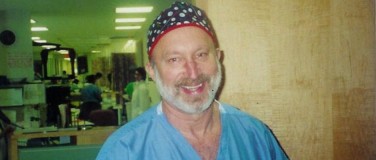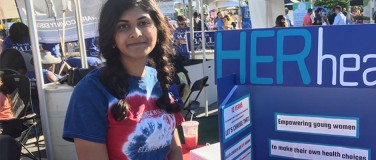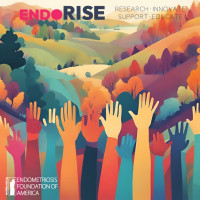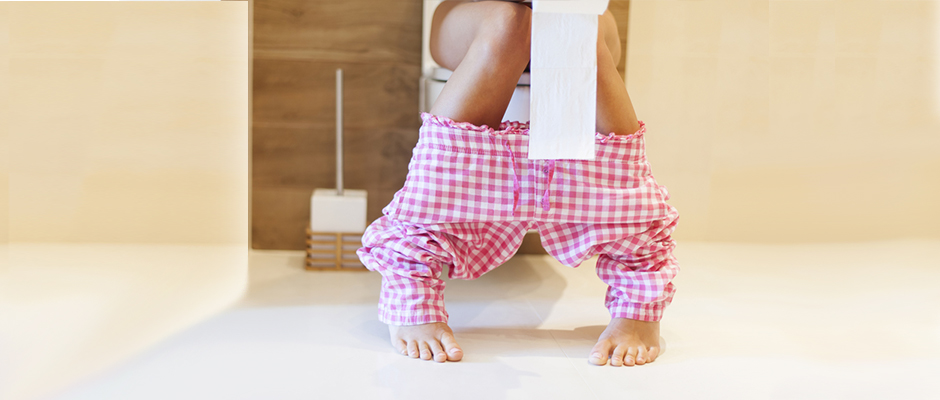
What's it like to live with both endometriosis and Crohn's disease?
A confusing mélange of overlapping symptoms like sudden flare-ups with chronic inflammation, abdominal pain, bowel pain and fatigue. By conservative estimates, 7 million American women have endometriosis, while 780,000 American men and women have Crohn's disease, an inflammatory bowel disease (IBD) that causes inflammation of the digestive tract. Countless women with endometriosis spend years misdiagnosed as having IBD or Irritable Bowel Syndrome (IBS). However, an unreported number indeed live life with both Crohn's and endo.
Maddy Gross, 22, is one of them. The Maryland-native and comedian says that her parents always told her she had a "funny tummy." She thought daily stomach aches were the norm for everyone. It wasn't until her senior year of high school when Gross experienced mystery symptoms like slurred speech and circulation issues. Doctors initially diagnosed her with Postural Orthostatic Tachycardia Syndrome (POTS), a nervous system disorder, but further testing revealed Crohn's. Unfortunately, Gross's health scare didn't end there. After years of irregular periods and pelvic pain, she underwent a laparoscopy and was diagnosed with endometriosis in December.

"All of my pain related to endometriosis had always been in a similar area as the Crohn's," recalls Gross, "but I could tell that this was different. But I just thought this was a different Crohn's-related thing. I kept thinking 'no way is there that much wrong with me.'"
Shireen Hand says since age 12, her periods have left her doubled over and bleeding through her clothes.
"It wasn't until I started experiencing pain during sex when I was 21 that I started to think something might be wrong," Hand, now 34, tells The Blossom. The Leicestershire, UK-native and blogger was diagnosed with endometriosis at age 22.
Even though her brother has Crohn's, she never expected that she would one day too—but the signs were there. In January she was hospitalized after a sudden bout of nausea, diarrhea, and intense abdominal pain. She thought she had food poisoning, her doctor suspected appendicitis, but she was sent home anyway. The pain only worsened. In February she collapsed from contraction-like abdominal cramps and was rushed via ambulance to an ER. It seemed like a nasty endo flare-up, but this time things went horribly awry.
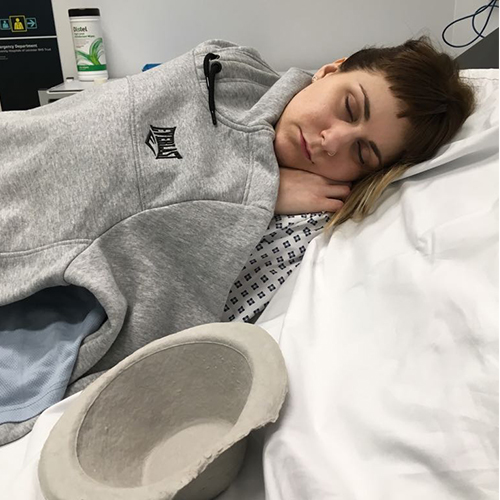
"I had an 'accident' while in the ambulance and again on arrival at the hospital, and by this time I had diarrhea, and there was a lot of blood," she recalls. "It got to the point where it was just pure blood coming out whenever I opened my bowels. I stayed in hospital for almost three weeks and after constant scans, X-rays, a colonoscopy and all manner of other tests, I was finally diagnosed with Crohn's disease."
The link between the two conditions
Just how common is it for someone to have both Crohn's and endo? A 2012 study published in the journal Gut, found that endo women might be up to 80 percent more likely to develop some type of IBD like Crohn's. The study looked at 37,661 Danish women who were hospitalized for endometriosis between 1977 and 2007. The researchers found that 320 had IBD—228 with Ulcerative Colitis (UC) and 92 with Crohn's. Women who self-reported having endo had a 50 percent higher chance of developing IBD compared to the general population. But for women who had a surgical confirmation of endo, the risk for IBD skyrocketed to 80 percent compared to the general population. The study's authors made it clear that it is unknown why the two conditions may be related.
A 2015 paper in the BMJ highlights how endo can eerily mimic Crohn's. The researchers presented the case of a 45-year-old woman with moderate small bowel obstruction, with a CT scan showing inflammatory features of Crohn's disease. Three months after a steroid treatment helped settle the inflammation, she headed to the ER with a complete small bowel obstruction. Further testing, including a laparoscopy, confirmed the true culprit: bowel endometriosis, with no Crohn's disease.
RELATED: When IBS Is Really Endometriosis
"This case highlights that endometriosis should always be considered when women of childbearing age present with bowel obstruction, even if the patient has no other evidence of the disease," the authors write.
Rebecca Flyckt, MD, an OB-GYN at Cleveland Clinic, says that she has encountered endo-Crohn's patients.
"The vast majority of women will have one or the other, not both," Flyckt tells The Blossom. "That said, because some kind of immunologic dysfunction may underlie the development of both endometriosis and Crohn's disease, it is not unthinkable that both could come about in the same person. We must be alert to this possibility."
Flyckt says that because the two conditions share many common symptoms, it is easy for one to fly under the radar while the other is being treated.
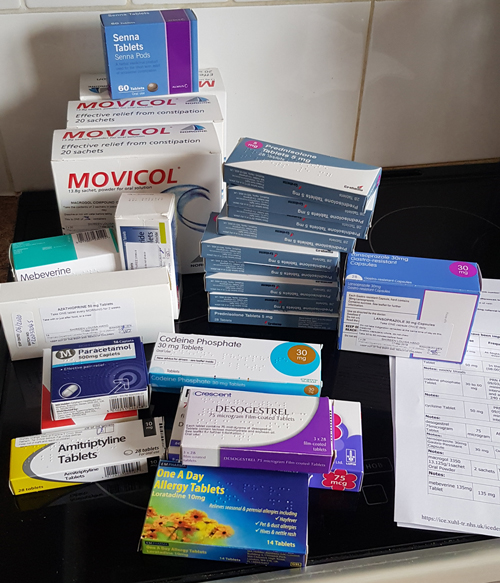
"One diagnosis may, unfortunately, mask the other and/or delay diagnosis, sometimes for years," she adds. "Both [Crohn's and endo] occur during the reproductive years. Symptoms of crampy pain before, during or after bowel movements can be a sign of either disease. Both can present with rectal bleeding. Bowel obstruction due to strictures can occur with either Crohn’s or bowel endometriosis. There is no 'sure sign' [for either disease] like weight loss, nausea, diarrhea, low appetite or constipation, although fevers are unusual with endometriosis. Only careful evaluation and typically a colonoscopy with biopsies will successfully distinguish one cause from the other."
Sunanda Kane, MD, a gastroenterologist at Mayo Clinic, says there are more signs that doctors and patients can clue into when trying to pry apart Crohn's and endometriosis. Endo can potentially be managed with surgery or hormone treatments, but "none of these things will help Crohn's disease," says Kane. "Endometriosis is cyclical in nature, with symptoms occurring usually around the time of menses. Crohn’s symptoms would not be as cyclical. Crohn’s responds to immune suppression while endometriosis historically has not...so, my advice to women is to listen to their bodies as they will usually be able to tell the difference between symptoms of each condition."
But as many endo women can attest, arriving at an endometriosis diagnosis and finding answers and treatment are not always so simple. Endo women often experience a decade-long delay in diagnosis as doctors zero in other conditions like IBS, Pelvic Inflammatory Disease, ectopic pregnancy, STD's or fibroids. While endo can be diagnosed via laparoscopic excision surgery with biopsy, endometriosis specialists are scarce, and many OB-GYN's are not trained to operate on the bowel, a necessary part of excising bowel endometriosis. Arriving at a Crohn's diagnosis can be just as maze-like. There's no one simple test to confirm the disease, although a colonoscopy or endoscopy with biopsy can provide confirmation to a gastroenterologist.
'I'm not crazy for being in pain'
As Gross and Hand learn how to navigate life with brand-new diagnoses of endo and Crohn's respectively, Flyckt says they face unique health challenges ahead.
She says that it is important that they find specialists who are familiar with both diseases and who can work together to come up with a coordinated health plan.
"They need to be aware of common misdiagnoses like Irritable Bowel Syndrome or fibromyalgia," she adds. "For women who have Crohn's and notice dysmenorrhea, infertility, or worsening of their typical symptoms with menses, a referral to an endometriosis specialist may be beneficial."
Gross says that she now grapples with self-doubt about her health.
"Sometimes you feel 'oh my god, am I making this up?'" she says. "People tell you, you are making it up and sometimes you think you are. It's important to stop and say 'no, this is happening to me, too. I'm not crazy for being in pain."
Hand says she's been educating others on her journey with both diseases.
"Bowel troubles are a well-known symptom of endometriosis—particularly if endometriosis is on or in the bowels," she says. "But although I have several organs 'stuck' to my bowels due to adhesions, I don't have endometriosis in my bowels. I often see women talking about bowel problems and asking if this is normal with endometriosis, and others are quick to jump on them and tell them that it's endometriosis in their bowels. But I'm proof that's not always the case."
Still, even Hand admits she has lots to learn about her body. "I've found it more difficult because I don't now know what is endometriosis and what is Crohn's when I experience pains. So, when I go to the doctors or the hospital, I have to tell everyone everything and let them decide what is causing these issues, whereas previously, I knew exactly, or at least I thought I knew exactly, what was going on inside of me and I was the one in control of it," Hand says.
"I feel very lost and very sensitive about what the last seven months have brought my way. I'm still trying to understand what is happening inside of me, trying to learn about this disease, what it means in relation to my other illnesses and what it means going forward. Life is very much up in the air at present."



